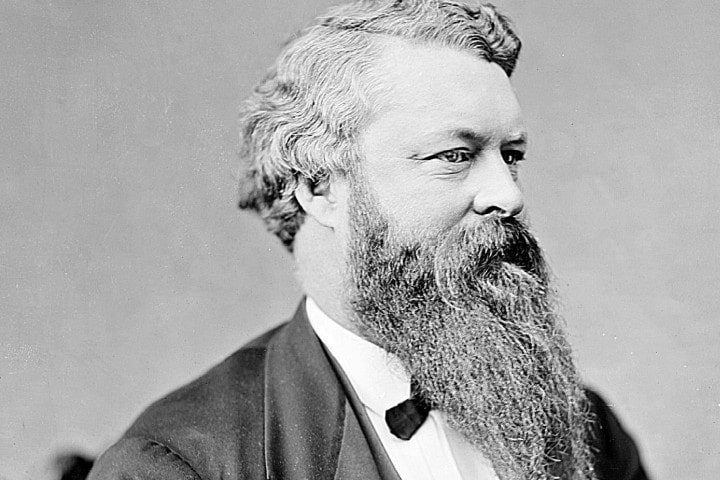
In an Associated Press article published Thursday, the issue of whether the Senate can try a former president was addressed. Initially, the three AP writers indicated that the case of a 19th-century secretary of war, William Belknap (shown), who was impeached by the House and subsequently tried in the Senate, served as precedent for a trial of former President Donald Trump.
“It is true that no president has faced impeachment proceedings after leaving office, but House managers say there’s ample precedent. They cite the case of former Secretary of War William Belknap, who resigned in 1876 just hours before he was impeached over a kickback scheme,” the AP story stated, adding, “The House impeached him anyway, and the Senate then tried him, winning a conviction. Democrats also note that Trump was impeached by the House while he was still president.” (Emphasis added.)
One problem with the AP story is that this is historically inaccurate. Belknap was actually found not guilty in the Senate, as almost two dozen senators who believed Belknap was actually guilty voted not guilty, arguing that, as Belknap was now a private citizen, the Senate no longer had any jurisdiction in the case.
Rather than serving as precedent for the Senate to try Trump, the Belknap case is clear precedent not to try him.
To AP’s credit, after I sent an e-mail to one of the story’s authors, Eric Tucker, he e-mailed me back thanking me for catching the error. He further told me that the story had been corrected. Now, instead of reading winning a conviction after the words “the Senate then tried him,” it reads, “though he was ultimately acquitted.”
Still, the tone of the article was clearly slanted against Trump. For example, while the article quotes Trump telling a crowd of supporters on January 6, “If you don’t fight like hell, you’re not going to have a country anymore,” the article neglected to quote him telling the crowd to protest peacefully at the Capitol. The article also added opinion, writing, “There was no widespread fraud in the election.” The very fact that the AP added the word widespread makes it an opinion. After all, who is to say what is and what is not widespread?
Despite the AP story being corrected to say that Belknap “was ultimately acquitted,” the authors fail to explain why Belknap was found not guilty in the Senate. The fact of the matter is, there was general agreement in the Senate that Belknap was guilty of ordering soldiers at Fort Sill (in present-day Oklahoma) and other military forts to purchase supplies only through vendors authorized by him. Belknap even sold breech-loading and repeating rifles to hostile American Indians.
Belknap had gotten Congress to give him the sole power to select and license agents, known as sutlers, to provide goods at army posts. This included sales to soldiers, who had no other option other than to buy from Belknap’s licensed agents, often leaving many of these soldiers economically destitute.
When it became clear that the House of Representatives was going to impeach him, Belknap resigned as President Grant’s secretary of war. (Although Grant is considered by most historians to be not guilty of such, corruption was rampant during his tenure.)
The House opted to impeach Belknap anyway, and sent five articles of impeachment over to the Senate. Much of the action in the Senate consisted of arguments on whether the Senate even had jurisdiction to try Belknap. His lawyers argued that the Senate did not, but the Senate voted 37-29 to assume jurisdiction. Although a majority of the Senate voted to convict Belknap, the 35-25 vote fell well short of the two-thirds majority the Constitution requires for conviction on an impeachment charge.
As mentioned above, 23 of the “no” votes came from senators who expressed agreement that Belknap was guilty of the charges, but they voted against conviction, arguing that Belknap was now a private citizen, and therefore, the Senate lacked jurisdiction.
Federal prosecutors later opted not to try Belknap in civilian court, and the case against him was ultimately dismissed.
The bottom line is that the Belknap case is a precedent for not trying former government officials via the impeachment process. While Belknap was widely considered to merit removal from office, once he resigned, the Constitutional provision of removal by the impeachment process no longer applied — a person cannot be removed from office if he no longer holds that office.
In Trump’s case, it is a matter of opinion as to whether Trump’s actions merit condemnation. Unlike Belknap, Trump’s actions clearly do not rise to the level of a crime, particularly the crime of incitement, considering he urged his supporters to protest peacefully. Trump had the right of free speech to denounce the validity of the election, and his supporters likewise had the Constitutional right to peacefully protest. The fact that a small minority of the crowd choice to invade the Capitol is neither the fault of Trump nor his peaceful supporters.
It is inaccurate reporting such this AP story that leads many Americans to think otherwise.


